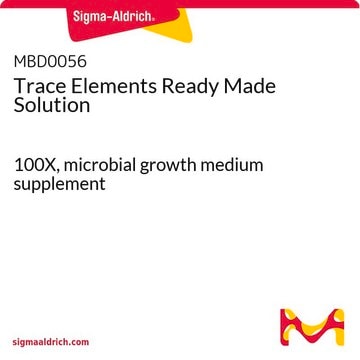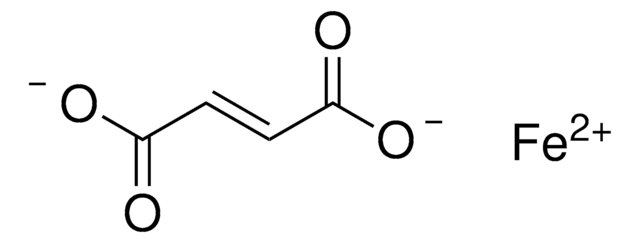F0518
Ferrous sulfate chelate solution
100 ×, suitable for plant cell culture
Se connecterpour consulter vos tarifs contractuels et ceux de votre entreprise/organisme
About This Item
Code UNSPSC :
10171502
Nomenclature NACRES :
NA.72
Produits recommandés
Stérilité
sterile-filtered
Forme
solution
Concentration
100 ×
Technique(s)
cell culture | plant: suitable
Application(s)
agriculture
Température de stockage
2-8°C
Application
Ferrous:EDTA chelate is a redox active form of bound iron. Ferrous:EDTA chelate will give up its iron to plant iron chelators. This iron chelate may be useful in a wide range of studies on iron metabolism and regulation in plants and plant oxidative processes.
Composants
Contains 2.785 g/L FeSO4 ⋅ 7H2O and 3.725g/L EDTA 2Na ⋅ 2H2O
Code de la classe de stockage
12 - Non Combustible Liquids
Classe de danger pour l'eau (WGK)
WGK 1
Point d'éclair (°F)
Not applicable
Point d'éclair (°C)
Not applicable
Certificats d'analyse (COA)
Recherchez un Certificats d'analyse (COA) en saisissant le numéro de lot du produit. Les numéros de lot figurent sur l'étiquette du produit après les mots "Lot" ou "Batch".
Déjà en possession de ce produit ?
Retrouvez la documentation relative aux produits que vous avez récemment achetés dans la Bibliothèque de documents.
Les clients ont également consulté
Neeraja Vajrala et al.
BMC microbiology, 11, 37-37 (2011-02-23)
In response to environmental iron concentrations, many bacteria coordinately regulate transcription of genes involved in iron acquisition via the ferric uptake regulation (Fur) system. The genome of Nitrosomonas europaea, an ammonia-oxidizing bacterium, carries three genes (NE0616, NE0730 and NE1722) encoding
T Franza et al.
Molecular plant-microbe interactions : MPMI, 12(2), 119-128 (1999-02-02)
Low iron availability is a triggering signal for coordinated expression of the genes encoding pectate lyases PelB, PelC, PelD, and PelE, and chrysobactin iron transport functions, which are two main determinants of phytopathogenicity of the Erwinia chrysanthemi strain 3937. The
Abhishek Jain et al.
Applied microbiology and biotechnology, 102(10), 4563-4575 (2018-04-05)
Nickel (Ni(II)) toxicity is addressed by many different bacteria, but bacterial responses to nickel stress are still unclear. Therefore, we studied the effect of Ni(II) toxicity on cell proliferation of α-proteobacterium Caulobacter crescentus. Next, we showed the mechanism that allows
Jaita Pal et al.
Indian journal of experimental biology, 48(12), 1210-1218 (2011-01-22)
Cellular damage caused by reactive oxygen species has been implicated in several diseases and hence antioxidants have significant importance in human health. Cold water, hot water and methanolic extract of Pleurotus squarrosulus were evaluated for antioxidant activity against hydroxyl radical
Luis A Sayavedra-Soto et al.
Methods in enzymology, 486, 403-428 (2010-12-28)
The chemolithoautotroph Nitrosomonas europaea oxidizes about 25 mol of NH(3) for each mole of CO(2) that is converted to biomass using an array of heme and nonheme Fe-containing proteins. Hence mechanisms of efficient iron (Fe) uptake and homeostasis are particularly
Notre équipe de scientifiques dispose d'une expérience dans tous les secteurs de la recherche, notamment en sciences de la vie, science des matériaux, synthèse chimique, chromatographie, analyse et dans de nombreux autres domaines..
Contacter notre Service technique










